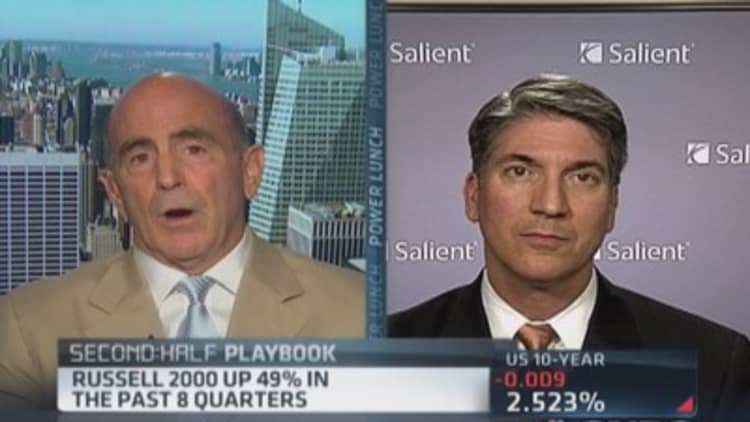"Wellness" programs are all well and good—just don't punish people for not participating in them.
The American public overwhelmingly says it's a good idea for employers to offer workers programs that promote healthy behavior, but a solid majority also firmly oppose financial penalties linked to those programs, a new poll finds.
The Kaiser Health Tracking Poll released Tuesday also found increases in the number of people whose families have been directly affected by Obamacare, although most still said they hadn't been affected one way or the other as of yet.
The poll further found that stories about long waiting lists at Veterans Affairs (VA) hospitals were more closely followed than stories about Obamacare in recent months, and that a majority of people who have either served in the military or had family members who did said that care from the VA was worse than the care that most Americans receive.
Read MoreTaking the pulse of health-care stocks
Overall opinion on Obamacare remained unchanged in recent months, with 45 percent of people having an unfavorable view, compared to 39 percent with a favorable stance.
That health-care reform law increased the percentage of health-coverage costs that companies could use to reward employers for participating in wellness programs. Advocates argue that these programs can lead to a healthier overall workforce that is less likely to use expensive medical benefits under their insurance plans. Under Obamacare, the cap on rewards for wellness programs was increased from 20 percent of total health coverage costs to 30 percent.
Seventy-four percent of people said such programs are appropriate, according to the Kaiser Health Tracking Poll. Among people who receive employer-provided health insurance, support was even higher, with 80 percent of them supporting the idea of wellness programs.
But there were also strong majorities that oppose penalizing workers for failing to participate in, or not meeting the goals of wellness programs, which can include initiatives to help workers lose weight, stop smoking and undergo biometric screenings.
A total of 62 percent of the 1,202 adults polled opposed employers charging workers more for health insurance if they don't participate in wellness programs. Another 74 percent oppose employers imposing such hikes in health plan premiums if workers can't hit certain goals of the programs, according to the Kaiser poll, which had a margin of error of plus or minus 3 percent.
People who receive health insurance through their employers had virtually the same response rate to those financial disincentives, the poll found.
Read MoreCourt rules for companies over Obamacare mandate
Among U.S. companies, financial incentives to participate in wellness programs still are more common than financial penalties—although there has been an increase in the number of firms that are inclined to use the stick rather than the carrot for such programs.
A recent study by the consulting firm Towers Watson said that 22 percent of companies have outcome-based incentives for wellness programs other than ones related to tobacco use, a figure that is expected to reach 46 percent by 2015 if companies follow through with their stated plans.
Towers Watson found that two-thirds of companies "also also use financial incentives to encourage participation in wellness activities, and 22 percent of those companies (especially best performers) design these as penalties."
In coming years, "while employers plan to increase their use of incentives, the use of penalties such as increases in premiums or deductibles for employees who don't complete the requirements of health-management activities will grow even more," Towers Watson said.
The consultancy found that by 2016, more than 60 percent of the companies it surveyed plan to increase health insurance premiums or deductibles for workers who don't complete the requirements of health management programs.
Towers Watson also noted that while wellness programs are widely offered by companies, "average employee participation rates leave much to be desired."
"On average, participation in programs are low, with health-appraisal participation at an average of 50 percent and for the truly critical programs (including lifestyle change and health management programs such as weight-management programs, chronic disease management and stress management), participation rates are far below 20 percent," the company said.
Read More
In the other Kaiser poll findings released Tuesday, 53 percent of respondents said that Obamacare has not had much of an impact on their families. That compares with the 62 percent who gave that same answer in January, "perhaps indicating more people are starting to see the law having a direct or indirect impact on them or their families," the Kaiser Family Foundation said in a statement.

That 9 point drop came during the same time as the vast majority of the 8 million people who signed up for Obamacare insurance plans enrolled via government-run exchanges.
The number of people saying Obamacare had left their families better off increased somewhat, from 12 percent in January to 18 percent in June, but remained low relative to the number who said their families were worse off as a result of the law. Twenty-six percent of respondents said their families were worse off as a result of the law.
Despite the wide media coverage about Obamacare over the past six months, it was stories about the long waiting list at Veterans Affairs hospitals that were the most read or watched health-policy stories for the first six months of 2014, according to the Kaiser poll.
Sixty-two percent of respondents said they followed the VA story closely or fairly closely, edging out stories in May about how many people had enrolled in Obamacare plans, and stories in February about how some companies will have another year to comply with the Obamacare rule that they offer affordable health insurance to workers or pay a fine.
A majority of people who live in military households, 53 percent, said care that veterans receive in VA hospitals is worse than what most Americans receive.
Just 23 percent of those responded said the care was about the same, and only 18 percent said it was better.
—By CNBC's Dan Mangan



